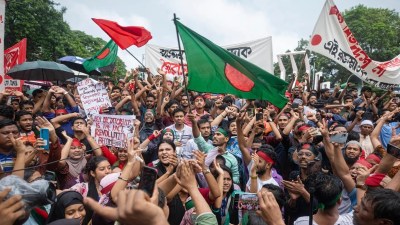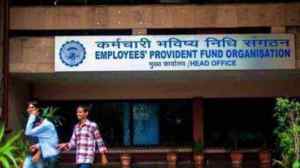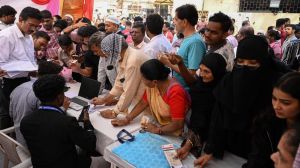A booby trap called Mamata
If the NDA government is contemplating something as foolish as an ordinance to declare five districts of West Bengal as disturbed, which i...

If the NDA government is contemplating something as foolish as an ordinance to declare five districts of West Bengal as disturbed, which it seems to be doing to placate Mamata Banerjee, it is asking for big trouble. It is believed to be considering this option in place of President8217;s Rule, which the Trinamool Congress has demanded.
This is the surest way of making a martyr of Jyoti Basu. He will have ample grounds then to tell the people that he was not even allowed to retire in peace and that he had to stay on to fight the fascist forces. Up to now, Mamata had been slowly bleeding him. By demanding President8217;s Rule, she will only give him a new lease of life.
Mamata, and the BJP, may calculate that the move would consolidate anti-Left forces behind her. That could happen but it could also activate the vast structure built by the CPM, and generate mass sympathy for the man who ruled West Bengal for 23 years. Mamata may believe that this will not happen. After all, there were few tears shed for the BJP governments dismissed by P.V. Narasimha Rao after the demolition of the Babri Masjid and BJP did not get a majority in any of the four states once elections were held. However, whenever there has been a wronged chief minister, he or she has evoked widespread sympathy, whether it was N.T. Rama Rao and Farooq Abdullah in the early 8217;80s, or Rabri Devi last year.
All this should be lesson enough for Mamata. But then today8217;s politicians don8217;t seem to learn from the mistakes of others. The BJP is faced with the problem of mounting pressure from Mamata. Given her volatile temperament, it does not know what to expect from her. She wants three things: Protection for her cadre; free and fair elections; and eventually the chiefministership of the state. By upping the ante, she is clearly trying to distance herself from the BJP to win back the support of the minorities. The BJP knows only too well that she is capable of resigning as railway minister, or even join hands with the Congress and would not like to take any chances with such a temperamental ally.
Home Minister L.K. Advani has already made it clear to Jyoti Basu in his latest letter that the Centre is not satisfied with Calcutta8217;s response to the situation. Theoretically, the Centre has four options before it. It can impose an emergency in the affected districts of West Bengal. This is an option it will not exercise because of the odium that is still attached to the concept of an emergency. Two, it can go in for President8217;s Rule. But this will be tricky given the fact that the BJP has no majority in the Rajya Sabha and several of its allies will not tolerate such a decision. Besides, it has already burnt its fingers by demanding President8217;s Rule in Bihar and failing abysmally. Three, it can give instructions to the state government under Article 355, but such a move could be laying the ground for President8217;s Rule if the state government does not heed its directive.
The fourth possibility, and this is what the government seems to be toying with, is to go in for an ordinance to enact a legislation modelled on the Armed Forces Act, powers for which flow out of Entry 2a of List One of the Seventh Schedule. That would empower the Centre to send the Army or any other central police force into the affected areas. This could give the Centre some leverage in West Bengal. Such an ordinance would, of course, have to be ratified by Parliament within a stipulated period. But one view is that the government can cross that bridge later and in the meanwhile it will be able to tell Mamata that it did its bit.
What President Narayanan, who did not play ball in the case of Bihar and UP, will have to say about such an ordinance is a matter of speculation. The president has already conveyed his unhappiness over the statements made by George Fernandes after his West Bengal visit. In the past, regions like Jamp;K, Punjab and the Northeast had been declared as 8220;disturbed8221;, but in all of them the violence had been directed against the State. So far this provision has not been used to quell violence unleashed by rival political groups.
Once a precedent is set, it is difficult to undo it. The Janata Party dismissed Congress governments in eight states when it came to power in 1977 on the plea that the party had lost the mandate of the people. Indira Gandhi returned the compliment in 1980 when she returned to power. Besides, there is no end to this process 8212; parts of Andhra Pradesh, which are under the control of the People8217;s War Group, can be declared as disturbed, or even the area controlled by Veerappan.
The BJP has to handle Mamata. There are ways other than Article 356 or the Disturbed Areas Act to ensure a free and fair election in West Bengal. The Election Commission may be activated, more observers despatched, and the media mobilised to keep a greater vigil. The Vajpayee government will only gain in stature if it says no to something that is so patently wrong 8212; legally, constitutionally, politically and morally.
By demanding President8217;s Rule, Mamata Banerjee will only give Basu a new lease of life
- 01
- 02
- 03
- 04
- 05































